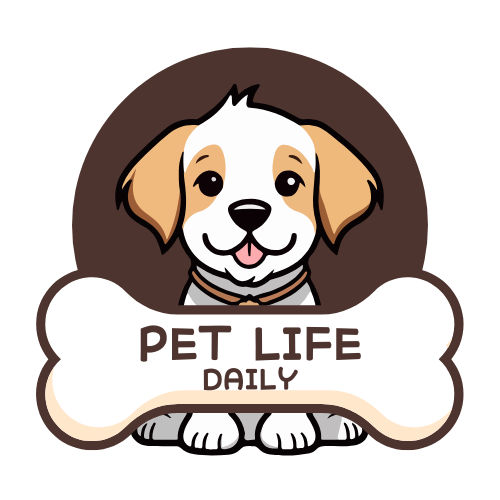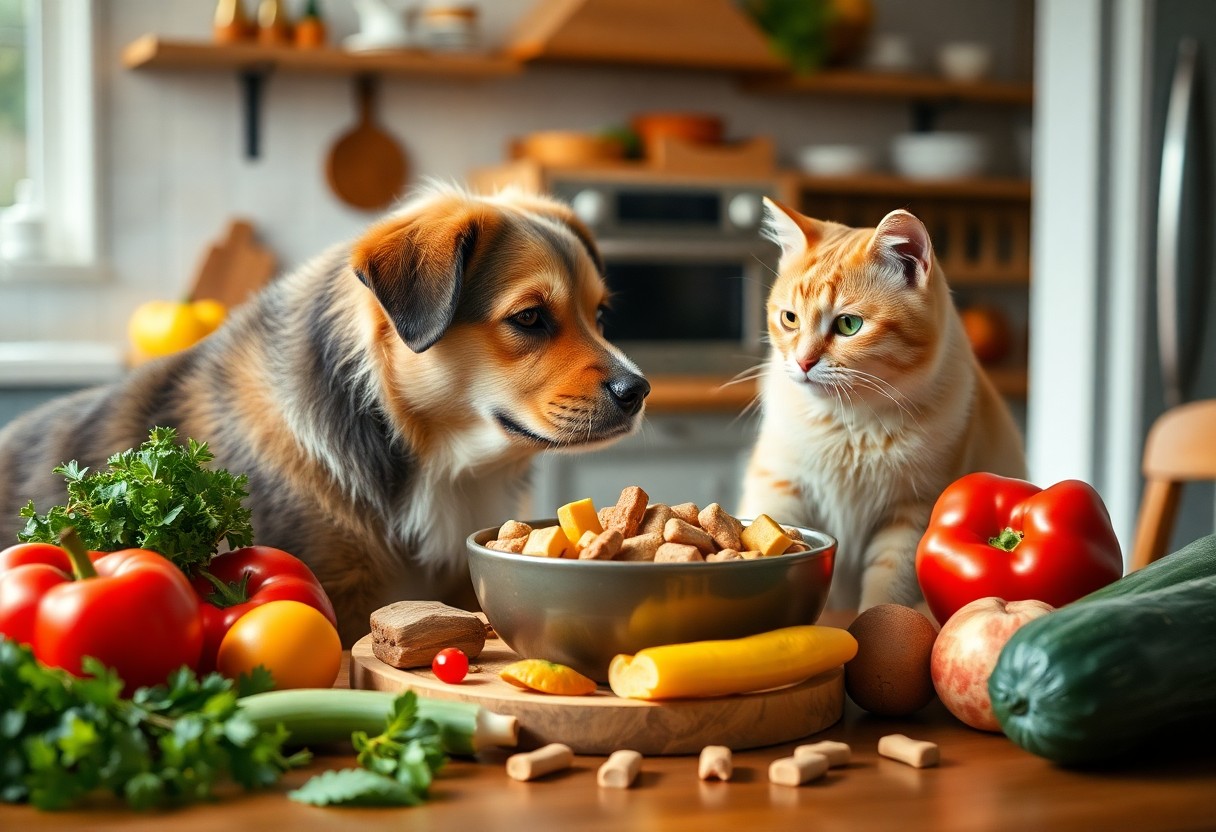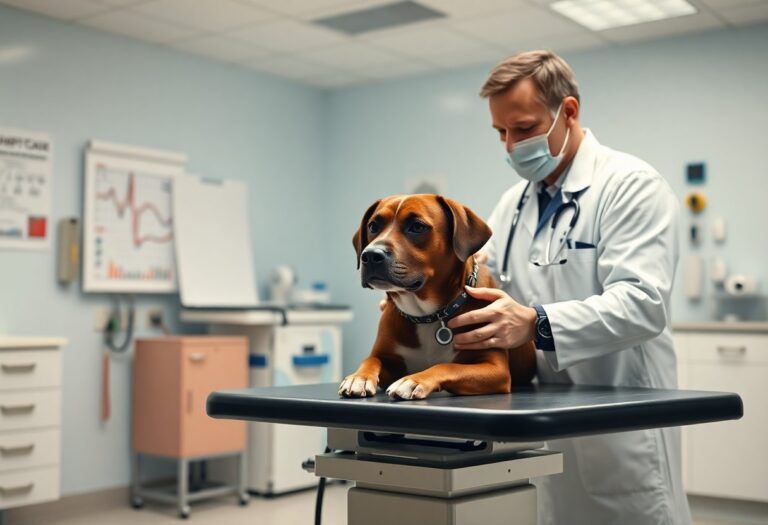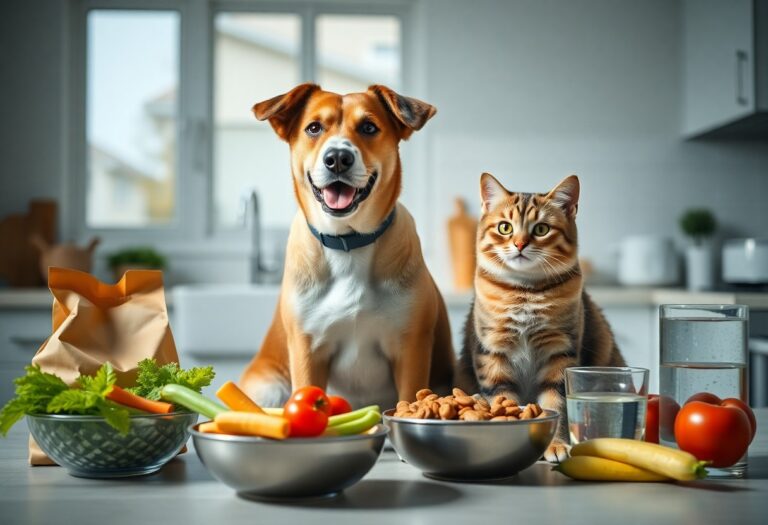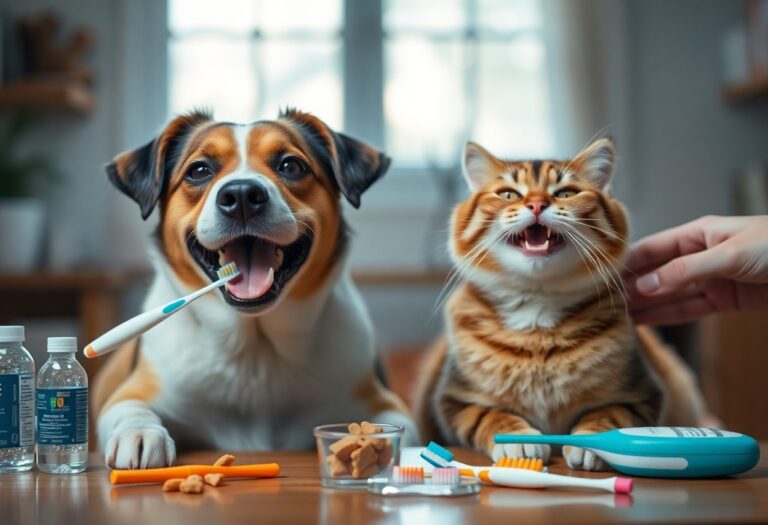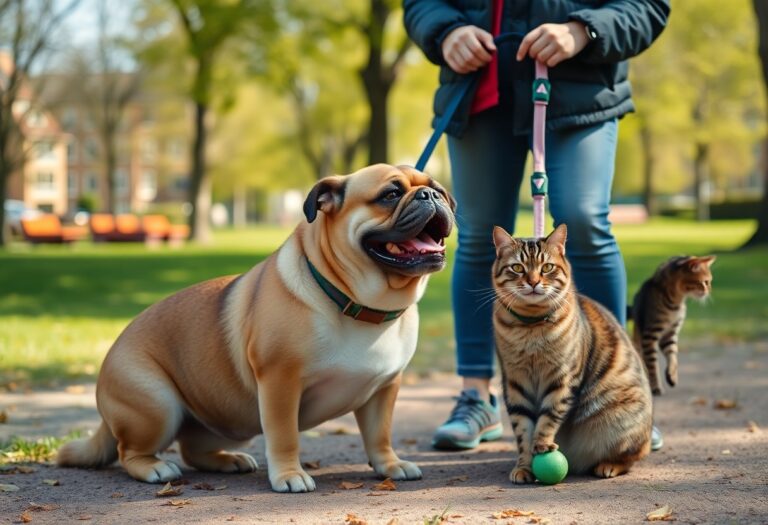Just like humans, your pets have unique dietary needs as they age, making it crucial to choose the best foods for their changing bodies. Senior dogs and cats often require diets that accommodate weight management, joint health, and digestibility. It’s important to look for high-quality ingredients that promote energy levels and overall well-being. In this blog post, you’ll discover the best food options available to help keep your furry friends healthy and happy throughout their golden years.
Nutritional Needs of Aging Pets
Essential Nutrients for Senior Dogs
Senior dogs often benefit from a diet rich in high-quality protein to maintain muscle mass, which tends to decrease with age. Look for ingredients like chicken, beef, or fish as primary components of their food. Additionally, their metabolism can slow down, necessitating a careful balance of calories to prevent obesity. Fiber is another important nutrient, aiding in digestive health and promoting healthy weight management. You might consider dog foods that incorporate ingredients like pumpkin or sweet potatoes for added fiber while providing important vitamins and minerals.
Senior dogs may also require joint support, particularly if they are prone to arthritis or other mobility issues. Supplements like glucosamine and chondroitin are often included in specialized senior dog foods, aiming to maintain joint health and improve mobility. Keep an eye out for omega-3 fatty acids, which are beneficial for reducing inflammation and supporting overall health, including skin and coat condition.
Vital Nutrients for Senior Cats
For senior cats, a diet focused on moisture content is important, especially since many older cats face kidney health challenges. This can mean incorporating wet food into their diet to ensure they remain hydrated, as hydration is often overlooked and can significantly impact their overall health. Additionally, a high-quality source of protein is equally important to support their muscle mass. Look for cat foods that list meat as the primary ingredient, avoiding fillers that lack important nutrients.
Fatty acids play a significant role in supporting your cat’s skin and coat health while also enhancing cognitive function. Foods rich in important fatty acids can help combat common issues such as dry skin and dull fur. It’s advisable to look for products specifically formulated for seniors, as these often contain a blend of nutrients tailored to the unique requirements of aging felines. From targeted vitamins to balanced minerals, selecting the right food can substantially improve your cat’s quality of life.
Top Nutrient-Rich Ingredients
Superfoods for Senior Dogs
Including superfoods in your senior dog’s diet can significantly enhance their overall health. Ingredients like blueberries and spinach are packed with antioxidants, helping to combat oxidative stress that accelerates aging. Additionally, sweet potatoes provide important vitamins such as A and C, along with dietary fiber that promotes digestive health. Incorporating fatty fish, such as salmon or sardines, into their meals can also provide high levels of omega-3 fatty acids, which support joint health and mobility as your dog ages.
Superfoods for Senior Cats
For your feline friend, superfoods like pumpkin and bonito flakes are excellent choices. Pumpkin is a great source of fiber, which can help cats maintain a healthy weight and digestive system. It also contains important nutrients like beta-carotene, aiding in eye health. Additionally, bonito flakes appeal to cats’ natural instincts and provide high-quality protein while enhancing palatability, making it easier to entice picky eaters.
Other nutrient-rich options for senior cats include chicken liver and spinach. Chicken liver is loaded with vitamins A, B, and iron, supporting energy levels and overall health. Spinach, similarly to dogs, offers antioxidants and promotes proper hydration due to its high water content, which is particularly beneficial for cats susceptible to urinary tract issues. Integrating these superfoods into your cat’s diet can not only fulfill their nutritional needs but can also make mealtime more exciting.
Personalize Their Diet: Considerations for Health Conditions
As your pets age, personalized dietary adjustments may be necessary to accommodate specific health conditions they might develop. You should always keep a close watch on your senior pets for signs of health issues and consult a veterinarian to tailor their diets accordingly. Not every food is suitable for every pet, and a one-size-fits-all diet can exacerbate existing health problems. Instead, closely evaluate their dietary requirements based on their health history, weight, activity level, and any medical conditions, thus ensuring that your furry companions get the best nutrition possible.
Dietary Adjustments for Obesity
Obesity poses a significant concern for senior pets, often leading to a slew of other health problems such as diabetes, joint pain, and heart disease. If you observe that your pet is overweight, consider switching to a weight management formula that is lower in calories but maintains adequate levels of crucial nutrients. Look for brands that offer high fiber content to help them feel fuller for longer without consuming excessive calories. Smaller, more frequent meals can also be beneficial to help manage their appetite while keeping them satisfied throughout the day.
Additionally, integrating more physical activity into your pet’s routine can effectively aid in weight loss. Just short walks or gentle playtime can contribute significantly to their health. Tracking their weight and making incremental adjustments to their meal portions will increase the effectiveness of your dietary plan, ensuring that your pet slowly reaches a healthy weight. Regularly consulting your vet during this process guarantees you remain on the right track and can adapt as necessary.
Managing Kidney Disease through Nutrition
Kidney disease can be a common ailment in senior pets, requiring special attention to their diet. Opt for protein-restricted diets that reduce the strain on their kidneys while still providing an adequate amount of high-quality protein. Keeping phosphorus levels low is equally crucial, as excessive phosphorus can worsen kidney function. Foods designed specifically for kidney health are often lower in sodium as well, minimizing blood pressure issues and fluid retention.
Supplements such as omega-3 fatty acids can also play a crucial role in supporting kidney function, as they may help reduce inflammation. It’s vital to work with your vet to establish a feeding schedule that ensures proper hydration; wet food can be beneficial since it helps increase fluid intake, a key element for kidney health. Regular monitoring of blood work and adjusting the diet as needed along the way will strengthen your pet’s quality of life.
Exploring options tailored to kidney health may initially be overwhelming, but familiarizing yourself with various brands and nutrient profiles can empower you to make informed choices. Reading ingredient labels for renal diets can guide you towards high-quality, specialized food that will support your pet’s condition effectively. Knowledge about what to look for will help maintain their vitality throughout their golden years.
Homemade vs. Commercial Diet: Finding the Right Balance
Benefits of Home-Cooked Meals
Home-cooked meals for your senior dog or cat offer several advantages. Preparing food yourself allows you complete control over the ingredients, ensuring that your pet receives fresh, high-quality nutrients tailored to their specific health needs. For example, adding ingredients like lean proteins, vegetables, and healthy fats can support your pet’s aging body, helping with everything from maintaining weight to enhancing coat health. You can also modify recipes based on any allergies or sensitivities your pet may have, making home cooking a safer option for some pets.
Another benefit is that home-cooked meals can entice picky eaters who have lost their appetite. As senior pets often experience changes in taste and smell, you can introduce new flavors easily. Experimenting with different ingredients or even cooking in small batches to ensure freshness can inspire excitement at mealtime and help your furry companion enjoy their food more. The homemade approach also fosters a deeper bond as you invest the time and effort to prepare meals personalized just for them.
Evaluating Commercial Pet Foods
When considering commercial pet foods for seniors, it’s critical to scrutinize the labels. Look for high-quality proteins listed at the top of the ingredient list, rather than fillers or by-products. Ingredients like chicken, beef, or fish are preferable, while a healthy balance of carbohydrates from sources such as sweet potatoes or brown rice can provide necessary energy. Additionally, minerals like calcium and phosphorus should be present in appropriate ratios to support joint health and overall well-being as your pet ages.
Additionally, pay attention to any added supplements such as antioxidants, omega fatty acids, or glucosamine. These can provide significant benefits for senior pets, aiding in joint mobility and immune system support. You want to ensure that the food you choose is formulated specifically for senior animals, as nutritional requirements shift with age. Choose products with AAFCO (Association of American Feed Control Officials) statements, which confirm that the food meets established nutrient profiles for senior pets, providing reassurance of its quality.
Transitioning to a Senior-Friendly Diet
Signs it’s Time for a Diet Change
As pets age, their nutritional needs evolve, and you may notice symptoms indicating that a dietary shift is necessary. Common signs include decreased energy levels, weight gain, difficulties in digestion, or signs of joint pain, such as limping or hesitance in movement. Unexplained weight loss, changes in appetite, or any signs of confusion can also warrant attention. If your dog or cat seems to struggle with activities they once enjoyed, it might be time to evaluate their current diet and consider how it aligns with their new life stage.
Obesity is a prevalent concern among senior pets. As caries and metabolism slow, your pet may become less active, leading to weight gain. If you notice an increase in body fat — such as a thick waistline or difficulty feeling their ribs — it’s a clear signal that a diet change could be beneficial. Consult with your veterinarian for tailored advice, as they can help assess your pet’s condition, recommend appropriate foods, and establish a plan that takes into account their age-related requirements.
Steps for a Smooth Transition
Starting the transition to a senior-friendly diet requires careful planning to prevent digestive upset. Begin by introducing the new food gradually, mixing it with their current diet. The rule of thumb is to start by incorporating roughly 25% of the new food with 75% of the old. After a few days, you can increase that ratio to 50-50. Continue this gradual process over 7 to 10 days until your pet is entirely eating the new diet. This slow introduction allows your pet’s digestive system to adjust without shock, minimizing the risk of gastrointestinal issues such as diarrhea or vomiting.
Monitoring your pet during this transition is key. Observe their response to the new food and take note of any adverse reactions, such as changes in behavior, appetite, or bowel movements. If everything progresses smoothly, you may even find that your pet enjoys the new flavors and textures more. If there are any issues, don’t hesitate to consult your veterinarian for further advice.
Conclusion
Hence, when it comes to the well-being of your senior dogs and cats, the right diet plays an imperative role in ensuring they lead a healthy and active life. By incorporating high-quality protein sources, easily digestible carbohydrates, and important vitamins and minerals into their meals, you can significantly improve their overall health. Consider options such as lean meats, specific grains, and age-appropriate commercial pet foods that focus on the nutritional needs of older pets. It’s also wise to consult with your veterinarian to tailor a diet that suits the unique health issues and dietary restrictions of your furry companions.
Your commitment to providing the best foods for your senior pets can enhance their quality of life and help them maintain their joy and energy levels despite aging. As you prioritize their nutrition, keep an eye on their weight, energy levels, and any changes in behavior or health. By making informed choices and seeking guidance from professionals, you ensure that your beloved dogs and cats receive the nutrients necessary for a vibrant senior life.
